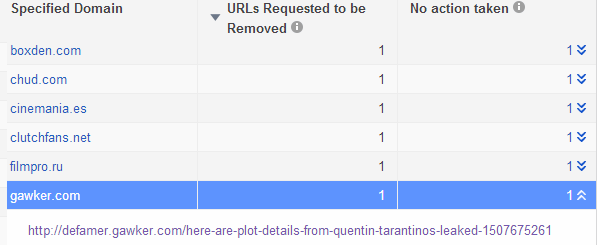TorrentFreak Email Update |
| UK Government Plans to “Ensure” That Google Hinders Online Piracy Posted: 02 Feb 2014 03:06 AM PST
"My point was that, when we get the education right and people understand that stealing intellectual property is wrong, and when the industry has alternative downloading models, if we exhaust fines and other means of stopping persons downloading illegally, we must consider some sort of custodial sentence for persistent offenders and people who operate on a commercial scale," he definitely said. While it is quite clear what he said, Weatherley has now told MusicWeek that he didn’t mean what he said at all. File-sharers won’t be getting locked up, he insists. So with regular file-sharers now somewhat relaxed, ministers are looking towards entities they can get heavy with, such as Internet and tech companies. This is something the music and movie industries are very keen on. For some time now they have been painting a picture of Google ignoring its responsibilities by not purging infringing results from its indexes. Reading the notes from the Bill’s debate this week it’s becoming increasingly apparent that UK Members of Parliament take keen notice of the industry rhetoric over online piracy but recall few of the important details. For example, the BPI complains that searches for a band name followed by “download” and/or “mp3″ often turns up music from unauthorized sources. In reality it’s true that people find unauthorized sources when they tailor their searches specifically to find illicit content, but just look at how that has been translated in the House of Commons. “When you search for the name of your favorite band..[..]..you will be directed to illegal sites. Something must be done about that,” said Pete Wishart MP. Untrue of course, but it gets worse. “[Another MP] mentioned an astonishing statistic…[..]..to the effect — I hope I have this right; he will correct me if I am wrong — that for the top 20 singles and albums for November 2013, 77% of first page search results for singles and 64% for albums directed the consumer to an illegal site. I have to say to the Minister that that surely cannot be allowed to continue,” said MP Iain Wright. Of course that’s just not true either, as this search for One Direction’s Midnight Memories shows. Several pages in and iTunes, Amazon, Spotify and several physical outlets are there – but no piracy at all. Still, the MPs believe that more needs to be done.
As the debate over search engine responsibilities in respect of piracy has mounted in the recent months, the question has always been in the background – would the government legislate to force companies such as Google to do what the music and movie industries have asked? While the “L” word wasn’t mentioned specifically this week, there was definitely a strong hint with the inclusion of a new clause titled Online copyright infringements: technology companies. “The Secretary of State will, within three months of this Act coming into force, report to both Houses of Parliament on proposals that will have the purpose of ensuring technology companies hinder access via the internet to copyright infringing material,” the clause reads. So it seems the ball is well and truly rolling towards Google and others being required by law to do something about online infringement. Quite what that might be remains unanswered for now, but will become clear in the months to come. Finally, there was a little gem of an exchange between MPs Jim Dowd and Iain Wright which will have the “copying is not theft” brigade up in arms. “[The] other aspect of illegal downloading is that it increases the costs for those who buy the product legitimately. Clearly, the rights owner needs to recover the loss from so much of it being traded illegally,” Dowd said. “People often say that this is a victimless crime, in the same way as stealing from a supermarket might be a victimless crime, but we all pay for it as a society,” came Wright’s response. “Supermarkets mitigate the risk of shoplifting by increasing prices. This is no different as an economic model.” Source: TorrentFreak, for the latest info on copyright, file-sharing and VPN services. |
| Google Refuses to Remove Links to Tarantino’s Leaked Script Posted: 01 Feb 2014 11:50 AM PST When Quentin Tarantino found out that copies of the script of his new movie ‘The Hateful Eight’ were circulating online, he decided to cancel the movie. Then, on Monday after Gawker published links to copies of the 146-page screenplay, things took a turn for the worse. The filmmaker was outraged by Gawker’s move and filed a lawsuit claiming that the blog was facilitating copyright infringement. “Their headline boasts ‘Here Is the Leaked Quentin Tarantino Hateful Eight Script’ – ‘Here,’ not someplace else, but ‘Here’ on the Gawker website,” the complaint states. “The article then contains multiple direct links for downloading the entire screenplay through a conveniently anonymous URL by simply clicking button links on the Gawker page, and brazenly encourages Gawker visitors to read the Screenplay illegally with the invitation to ‘Enjoy!’ it.”
Several DMCA notices were sent to Google on behalf of the director, targeting the Gawker article as well as several other forum posts and news articles. Tarantino claims that the URLs in question are infringing on his copyrights, but Google sees things differently. Of the 29 URLs Tarantino wants to have removed, Google took action for only a handful. The links that were disabled include copies of the leaked script on torrent sites and the file-hosting site Anonfiles. The news articles, blog posts and forum threads, however, remained online. The Gawker article Tarantino sued over, for example, is still listed in the search results. Google’s Transparency Report also points out that “no action” was taken to remove the URL in question. Google’s “no action” in response to Tarantino
TF asked Google to explain why the Gawker page hasn’t been removed, but we have yet to hear back from them. It is worth pointing out that the copies of the screenplay that are linked from article have since been removed from Scribd and Anonfiles, so the article isn’t “infringing” anymore. That said, Google also refused to remove links to other articles, which still have excerpts and screenshots of the leaked Hateful Eight script. It is safe to say that the search engine is clearly taking a stand here, perhaps in part to protect their own interests. If the case against Gawker goes ahead, it is likely that Google will get involved to prevent a damaging precedent. After all, the search engine is linking to millions of infringing files itself. Unlike Gawker, Google’s links are added to the search engine automatically, but a ruling on the issue is likely to have a broader effect. Source: TorrentFreak, for the latest info on copyright, file-sharing and VPN services. |
| You are subscribed to email updates from TorrentFreak To stop receiving these emails, you may unsubscribe now. | Email delivery powered by Google |
| Google Inc., 20 West Kinzie, Chicago IL USA 60610 | |
 During last week’s second reading of the UK Intellectual Property Bill the Prime Minister’s Intellectual Property Adviser Mike Weatherley said something highly controversial – persistent downloaders could be put in jail. For clarity:
During last week’s second reading of the UK Intellectual Property Bill the Prime Minister’s Intellectual Property Adviser Mike Weatherley said something highly controversial – persistent downloaders could be put in jail. For clarity: “[We] need to know what is being done to restrict access to sites that help someone find illegal or pirated copies, which brings me to the role of technology companies, particularly search engines, that allow consumers to find content,” Wright continued. “To what extent are those companies facilitating illegal access to copyrighted material by putting illegal sites at the top of their search lists?”
“[We] need to know what is being done to restrict access to sites that help someone find illegal or pirated copies, which brings me to the role of technology companies, particularly search engines, that allow consumers to find content,” Wright continued. “To what extent are those companies facilitating illegal access to copyrighted material by putting illegal sites at the top of their search lists?”
